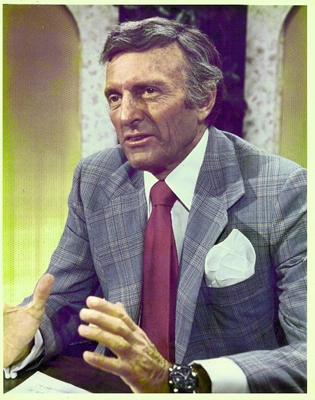Long before hard-hitting, news-making political talk shows cluttered television, and long before Occupy Wall Street challenged corporate greed, there was Lou Gordon. I remember watching his show on television as a teenager. Today, I wish he were still around.
For Detroiters who might not remember, Gordon (1917 - 1977) was a one-time political reporter and pioneering television talk show host whose The Lou Gordon Show ran from 1965 until 1977.
Informed, opinionated, abrasive, confrontational and often controversial, Gordon was a hard-hitting champion of the little guy not afraid to take on big corporations, major celebrities, important politicians and those he deemed phonies. One of his interviews even affected the course of national politics.
Gordon's twice-weekly, 90-minute program originated in Detroit on Channel 50, WKBD. It quickly gained a following, and was syndicated to 13 major markets around the country including Boston, Philadelphia, Cleveland, Chicago, Los Angeles and San Francisco.

As Gordon declared at the beginning of each program, this show had "no teleprompters, no cue-cards, no idiot boards, no re-runs; just plain, ad-lib conversation in which we try to tell it like it really is..." For a locally produced program, The Lou Gordon Show had a remarkable national reputation. Reportedly, everyone from Howard Hughes to Burt Reynolds were fans.
Over the years, just about every politician and national candidate, celebrity, controversial figure and author on a book tour appeared on The Lou Gordon Show. Philadelphia Mayor Frank Rizzo walked off the show during his interview. Alex Haley told the moving story behind writing Roots. Carl Sagan spoke of the possibility of life in outer space. George Wallace defended his time as Governor of Alabama in a way which betrayed his ingrained racism. And Jimmy and Billy Carter, in separate shows, offered a study in contrasts.
Gordon never bowed down before the famous and wealthy. Challenged, comedian Bob Hope famously defended the reputations and his personal friendships with disgraced Vice President Spiro T. Agnew as well as President Richard Nixon.
There were as well the passing parade of Vietnamese generals, religious snake handlers (you should see Gordon roll his eyes), pimps, and masked Mafia hit men. As a teenager, I tuned in to see Gordon confront the likes of Bermuda Triangle proponent Charles Berlitz, Chariots of the Gods? author Erich von Daniken, and other assorted UFO abductees and Loch Ness monster advocates. This was provocative, thought-provoking television no matter who the guest. Gordon interviewed them all.
Gordon's most famous interview took place in 1967, and it affected the outcome of the following year's presidential race.
On August 31, 1967, Gordon interviewed three-term Michigan Governor George Romney, the father of current presidential candidate Mitt Romney. For a year, the elder Romney had been talked about as the Republicans' best hope for winning the White House. During the interview, Gordon asked Romney to explain his inconsistent position on American involvement in Vietnam. The elder Romney admitted to changing his position, and then -- perhaps feeling too comfortable on a talk show in his home state, said something he should not have said. What resulted was a you have to see it to believe it moment.
Romney's admission that he had changed his mind -- that he had in effect flip flopped, would not be as damaging as was his poor choice of words, "When I came back from Vietnam, I just had the greatest brainwashing that anybody can get." Apparently, Americans don't like their candidates brainwashed. Romney's campaign, which had been polling ahead of Nixon's, would never recover.
Gordon was one of the first journalists to come out publicly against the Vietnam War (which he did in 1964), and he was also one of the first commentators to publicly accuse President Nixon of wrongdoing in regards to Watergate. (Gordon was on Nixon's enemies list.)
Gordon challenged political machines and corporate greed -- especially the public utilities. He was the working man's champion, and because of it, his life was threatened on more than one occasion. Every Monday, those who worked with Gordon recall, television station WKBD received hate mail and death threats following the weekend's shows. Though Gordon was disliked by as many viewers as he was liked, his integrity was respected by all.
Gordon described himself as a "People's advocate. The voice of dissent." I wish he was still with us in these troubled times. More than ever, we need the likes of a Lou Gordon.
His son, A. Scott Gordon, has set up a webpage to keep his father's memory alive. And through it, he is selling a DVD of the best of the Lou Gordon program. The disc includes the May, 1977 tribute which aired nationally, "Lou Gordon Man of Conscience Man of Truth. A Tribute to Lou Gordon." It is hosted by friend and television talk host Tom Snyder. This tribute, now something of a time capsule, includes many of the interviews mentioned above as well as comments from Senators and personalities such as Dick Cavett and Ralph Nader.
[Image of Lou Gordon courtesy of Gordo Marketing.] Thomas Gladysz is a San Francisco arts journalist and author. He grew up in metro Detroit not far in time and place from Jeffrey Eugenides, and attended Michigan State University, where he wrote for its student newspaper and contributed to the Lansing State Journal. Nowadays, he writes about books, movies and popular culture for various websites and blogs.
